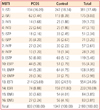Abstract
Objective
The aim of this study was to compare personality types between polycystic ovary syndrome (PCOS) patients and women with normal menstrual cycle.
Methods
A total of 2,311 Korean women aged 15-39 was recruited. After initial screening, 131 women were excluded who had polarity index under 45. The study subjects were divided into PCOS patients (n=833) and women with normal menstrual cycle (n=1,347). Self-administered questionnaire surveys, somatometry, blood test and transvaginal or transrectal ultrasound test were performed. By using Myers-Briggs Types Indicator (MBTI) personality types including characteristic index, function and temperament were also assessed.
Results
There was no significant difference in the frequency of personality types between the patient and control groups. Among 16 MBTI subtypes, the extraversion-sensing-thinking-judgement type was the most common in both groups, 25.69% in PCOS patients and 24.51% in control group. In analysis of the judgement-perception index, the perceiving type was predominant in PCOS patients (30.73%) than control group (25.09%) with a statistical significance (P=0.013). The average testosterone level in women with the extroversion type was 53.43 ± 20.13 ng/dL, which was significantly higher than women with the introversion type (51.58 ± 18.60 ng/dL).
Figures and Tables
Acknowledgments
This study was supported by the Korean genome analysis project (4845-301) funded by a grant from Korea Centers for Disease Control and Prevention.
References
1. Himelein MJ, Thatcher SS. Polycystic ovary syndrome and mental health: a review. Obstet Gynecol Surv. 2006. 61:723–732.
2. Janssen OE, Hahn S, Tan S, Benson S, Elsenbruch S. Mood and sexual function in polycystic ovary syndrome. Semin Reprod Med. 2008. 26:45–52.
3. Allport GW. Personality: a psychological interpretation. 1937. New York: Holt, Rinehart and Winston.
4. Park JS. Clinical counseling implication of the relationships between psychological type (MBTI) and personality adaptation type. J Korea Acad Psychol Type. 1999. 6:25–49.
5. Rotterdam ESHRE/ASRM-Sponsored PCOS Consensus Workshop Group. Revised 2003 consensus on diagnostic criteria and long-term health risks related to polycystic ovary syndrome. Fertil Steril. 2004. 81:19–25.
6. Kim JT, Sim HS, Je SB. A guide to the development and use of the MBTI. 1995. Seoul: Korean Psychological Testing Institute.
7. Baischer W, Koinig G, Hartmann B, Huber J, Langer G. Hypothalamic-pituitary-gonadal axis in depressed premenopausal women: elevated blood testosterone concentrations compared to normal controls. Psychoneuroendocrinology. 1995. 20:553–559.
8. Luthold WW, Borges MF, Marcondes JA, Hakohyama M, Wajchenberg BL, Kirschner MA. Serum testosterone fractions in women: normal and abnormal clinical states. Metabolism. 1993. 42:638–643.
9. Weiner CL, Primeau M, Ehrmann DA. Androgens and mood dysfunction in women: comparison of women with polycystic ovarian syndrome to healthy controls. Psychosom Med. 2004. 66:356–362.
10. Janowsky DS, Morter S, Hong L, Howe L. Myers Briggs Type Indicator and Tridimensional Personality Questionnaire differences between bipolar patients and unipolar depressed patients. Bipolar Disord. 1999. 1:98–108.
11. Janowsky DS, Boone A, Morter S, Howe L. Personality and alcohol/substance-use disorder patient relapse and attendance at self-help group meetings. Alcohol Alcohol. 1999. 34:359–369.
12. Janowsky DS, Hong L, Morter S, Howe L. Underlying personality differences between alcohol/substance-use disorder patients with and without an affective disorder. Alcohol Alcohol. 1999. 34:370–377.
13. Thorne BM, Fyfe JH, Carskadon TG. The Myers-Briggs type indicator and coronary heart disease. J Pers Assess. 1987. 51:545–554.
14. Lee HA, Auh QS, Jung KT, Chun YH, Hong JP. Personality type test (MBTI) of the Korean bruxism patients. Korean J Oral Med. 2008. 33:41–48.
15. Han AK, Kim OS, Won JS. A study on job stress and coping method by the personality types of clinical nurses. Clin Nurs Res. 2007. 13:125–136.
16. Roepke S, Ziegenhorn A, Kronsbein J, Merkl A, Bahri S, Lange J, et al. Incidence of polycystic ovaries and androgen serum levels in women with borderline personality disorder. J Psychiatr Res. 2010. 44:847–852.
17. Moran LJ, Hutchison SK, Norman RJ, Teede HJ. Lifestyle changes in women with polycystic ovary syndrome. Cochrane Database Syst Rev. 2011. (7):CD007506.
18. Keirsey D, Bates M. My shape, my face. 1999. Seoul: Korean Psychological Testing Institute.




 PDF
PDF ePub
ePub Citation
Citation Print
Print







 XML Download
XML Download